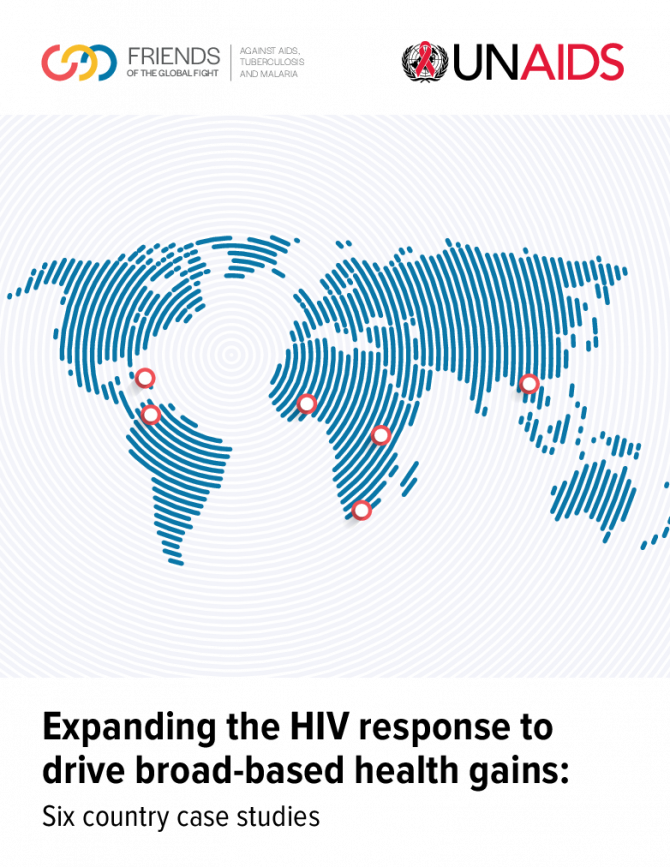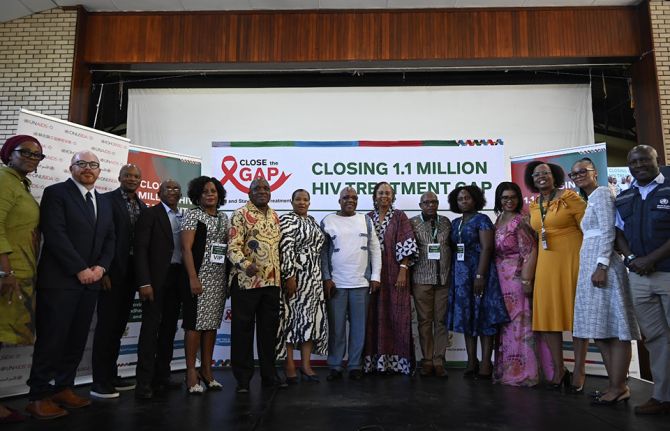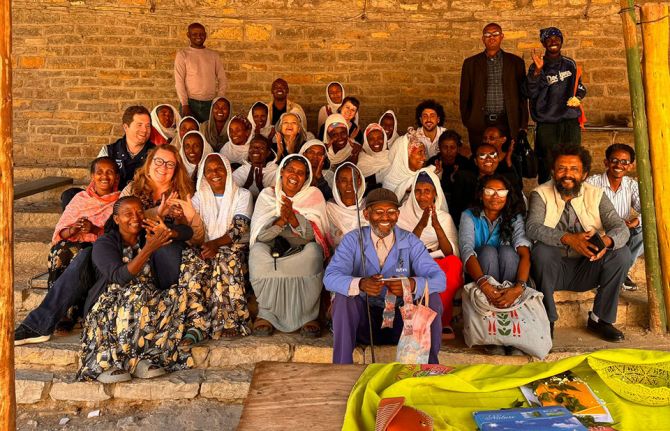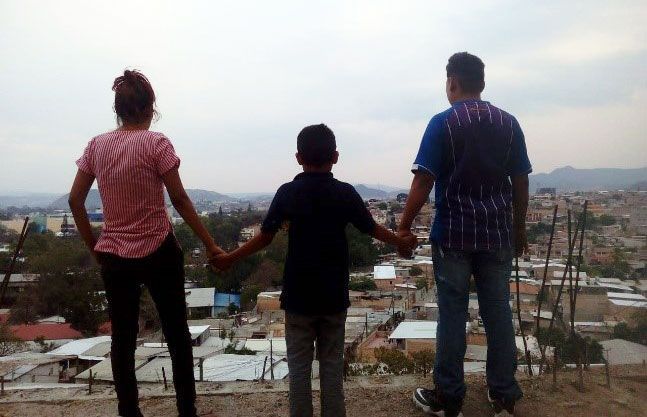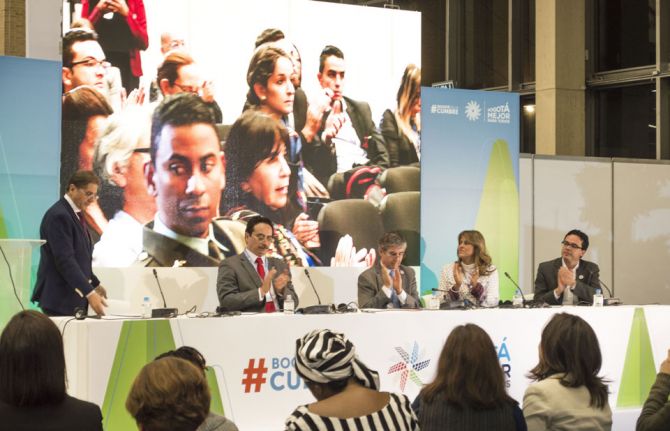COL
Documents
Expanding the HIV response to drive broad-based health gains: Six country case studies
15 April 2024
As progress lags in achieving most of the health targets of United Nations Sustainable Development Goal 3 (SDG 3), efforts to end AIDS as a public health threat by 2030 stand out as a beacon of hope. Since 2010, annual new HIV infections and AIDS-related deaths have declined globally by 38% and 51%, respectively. Although the world as a whole is not currently on track to reach all the SDG targets, evidence clearly indicates that ending AIDS as a public health threat by 2030 is achievable and that clear pathways exist to reach this goal.
Related
 Comprehensive update on HIV programmes in South Africa
Comprehensive update on HIV programmes in South Africa

25 February 2025
 Impact of the pause of US foreign assistance in Côte d'Ivoire
Impact of the pause of US foreign assistance in Côte d'Ivoire

19 February 2025
Impact of community-led and community-based HIV service delivery beyond HIV: case studies from eastern and southern Africa
30 January 2025
A shot at ending AIDS — How new long-acting medicines could revolutionize the HIV response
21 January 2025
Indicators and questions for monitoring progress on the 2021 Political Declaration on HIV and AIDS — Global AIDS Monitoring 2025
17 December 2024
UNAIDS data 2024
02 December 2024
Take the rights path to end AIDS — World AIDS Day report 2024
26 November 2024


Press Statement
UNAIDS welcomes new decision in Colombia allowing more affordable access to quality HIV medicines
04 October 2023 04 October 2023Colombia makes landmark decision to declare the HIV medicine dolutegravir of public interest, allowing the country to purchase or manufacture more affordable, generic versions of the live-saving HIV medicine
BOGOTÁ/GENEVA, 4 October 2023—UNAIDS applauds the government of Colombia for declaring the HIV medicine dolutegravir of public interest. This important breakthrough in public health measures will allow the government to issue a compulsory license, breaking the monopoly, and making it much more affordable for the Colombian government to purchase or manufacture. The new decision could mean that the price of the life-saving medicine is reduced by as much as 80%.
“When the power to produce health technologies is held by a few companies, the result all too often is that countries can’t afford the high prices and people who need newer products cannot access them,” said Luisa Cabal, UNAIDS Regional Director for Latin America and the Caribbean. “We are confident that this decision will have an impact across the whole region and beyond, as many middle-income countries are struggling to access generic markets of key health products to prevent and treat HIV infection.”
The World Health Organization recommends dolutegravir as the preferred first-line and second-line HIV treatment for all populations. As well as being effective, treatments incorporating dolutegravir-based regimens have demonstrated greater adherence, due to fewer side effects, while presenting enhanced, safety, and reduced likelihood of drug resistance.
“This decision represents a milestone for public health in Colombia. Since the Ministry of Health initiated the administrative procedures earlier this year, over 120 civil society organizations, other government agencies, academia and international organizations including UNAIDS supported this process,” said Andrea Boccardi Vidarte, UNAIDS Director for the Andean Countries. "Through our local, regional and global offices, UNAIDS will continue supporting the government on the implementation of this landmark decision.”
With this decision, the Colombian government estimates that it will be able to put 28 people on dolutegravir for the same price that it is allocated today to treat just one person. The implementation of the measure will allow the country to access less expensive, but just as effective, generic versions. A huge increase in reach with quality medicines which will save lives.
Colombia had already issued national guidelines in 2021 to prioritize dolutegravir as the recommended first-line antiretroviral treatment, in line with WHO recommendations. However, the high price of dolutegravir has remained an obstacle to expanding access and making it widely available to people living with HIV in the country.
This ruling will save lives in Colombia and across the region. The country hosts the largest number of Venezuelan migrants in the world (2.9 million as of October 2022). Recent studies have shown a 0.9% HIV prevalence among this migrant population, almost double the 0.5% HIV prevalence among the country’s adult population.
“This decision provides the government with the legal conditions to manufacture or purchase more affordable versions of this essential first-line antiretroviral treatment for all people living with HIV in Colombia, including Venezuelan migrants”, said Ms Cabal.
Compulsory licensing is a provision in the World Trade Organization (WTO) Agreement on Trade Related Aspects of Intellectual Property Rights (TRIPS Agreement). It enables governments to supply its citizens with generic versions of patented treatments either through domestic production or imports, ensuring health products’ prices are affordable.
The 2001 WTO Declaration on the TRIPS agreement and public health reaffirmed the rights of member states to make use of all flexibilities in the TRIPS agreement to protect public health, including compulsory licenses. More recently, in the 2021 Political Declaration on HIV/AIDS, countries committed to make use of TRIPS flexibilities, specifically geared to promoting access to medicines.
UNAIDS
The Joint United Nations Programme on HIV/AIDS (UNAIDS) leads and inspires the world to achieve its shared vision of zero new HIV infections, zero discrimination and zero AIDS-related deaths. UNAIDS unites the efforts of 11 UN organizations—UNHCR, UNICEF, WFP, UNDP, UNFPA, UNODC, UN Women, ILO, UNESCO, WHO and the World Bank—and works closely with global and national partners towards ending the AIDS epidemic by 2030 as part of the Sustainable Development Goals. Learn more at unaids.org and connect with us on Facebook, Twitter, Instagram and YouTube.
Contact
UNAIDS Latin America and the CaribbeanDaniel de Castro
tel. +507 6998 3175
decastrod@unaids.org
UNAIDS Geneva
Sophie Barton Knott
tel. +41 79 514 6896
bartonknotts@unaids.org
Video
Region/country


Press Release
UNAIDS welcomes announcement by Colombian government that will enable people access to the most appropriate HIV treatment for them
12 June 2023 12 June 2023UNAIDS welcomes the issuance of Resolution 881 of 2023 by the Ministry of Health of Colombia, which initiates the administrative procedure to evaluate the existence of reasons of public interest for issuing a compulsory license for dolutegravir (DTG)-based regimens. According to the ministerial resolution, the impact of this measure could mean a significant reduction of more than 80% of DTG’s price.
Dolutegravir (DTG) is an antiretroviral integrase inhibitor, recommended by the World Health Organization (WHO) as a first-line treatment option for people living with the human immunodeficiency virus (HIV). Regarding viral suppression and disease reduction, treatments incorporating DTG-based regimens have demonstrated greater adherence due to their lower incidence of adverse events while presenting enhanced effectiveness, safety, and reduced likelihood of resistance development.
Compulsory licensing is a provision in the World Trade Organization (WTO) Agreement on Trade Related Aspects of Intellectual Property Rights (“TRIPS Agreement”), that enables governments to supply its citizens with generic versions of patented treatments either through domestic production or imports, ensuring drug prices are affordable. WTO Inter-ministerial 2001 Doha Declaration reaffirmed the rights of member states to make use of all flexibilities in the agreement to protect public health, including compulsory licenses, “and the freedom to determine the grounds upon which such licenses are granted.” More recently, in the 2021 Political Declaration of the United Nations General Assembly High-level Meeting on AIDS, countries have committed to make use of TRIPS flexibilities “specifically geared to promoting access to medicines.”
"This resolution is a step forward to provide equal and sustainable access to best HIV treatment options for all people living with HIV in Colombia, nationals and migrants. This action shows the government’s commitment to close the treatment gap with assured quality affordable essential medicines which are easy to take and very well tolerated.”, says Andrea Boccardi, UNAIDS Director for the Andean Countries (Peru, Ecuador, Bolivia, and Colombia. "The government issued national guidelines in 2021, in line with WHO recommendations, but until now high prices of DTG have remained an obstacle to make it widely accessible to people living with HIV in Colombia."
The Colombian League for the Fight against AIDS and the IFARMA Foundation also celebrated the decision from the Colombian government. Both institutions participated on behalf of civil society in the updating of the Clinical Practice Guidelines (CPG) based on scientific evidence for the care of HIV/AIDS infection in adults, pregnant women and adolescents.
"The decision validates past initiatives of civil society in Colombia to achieve greater coverage of simplified treatments with fewer adverse effects at the lowest possible price, while at the same time it will reinvigorate the efforts of community-based organizations in education and promotion of adherence to ARVs, recognizing that structural barriers are factors that facilitate or hinder adherence to antiretroviral treatments", says Jorge Pacheco, Director of the Colombian League for the Fight against AIDS.
“Through this measure Colombia is taking an important step to guarantee people’s access to the most appropriate medication for them in line with international recommendations and commitments”, says Luisa Cabal, UNAIDS Regional Director for Latin America and the Caribbean. "Timely access to effective HIV treatment can save lives, improve health outcomes, enhance the quality of life, and contribute to the overall well-being of individuals living with HIV. This measure shows commitment to the global effort to combat inequalities in access to health."
UNAIDS commends and supports the Ministry of Health for its proactive approach to pursuing public interest and urges all stakeholders to collaborate in implementing Resolution 881 of 2023.
UNAIDS
The Joint United Nations Programme on HIV/AIDS (UNAIDS) leads and inspires the world to achieve its shared vision of zero new HIV infections, zero discrimination and zero AIDS-related deaths. UNAIDS unites the efforts of 11 UN organizations—UNHCR, UNICEF, WFP, UNDP, UNFPA, UNODC, UN Women, ILO, UNESCO, WHO and the World Bank—and works closely with global and national partners towards ending the AIDS epidemic by 2030 as part of the Sustainable Development Goals. Learn more at unaids.org and connect with us on Facebook, Twitter, Instagram and YouTube.
Contact
UNAIDS Latin America and the CaribbeanDaniel de Castro
tel. +507 6998 3175
decastrod@unaids.org
Region/country

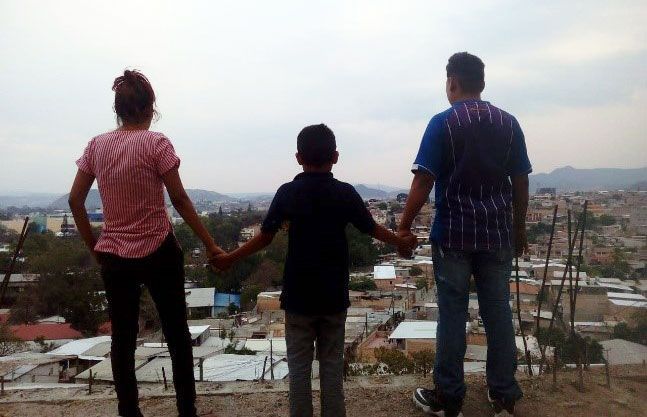

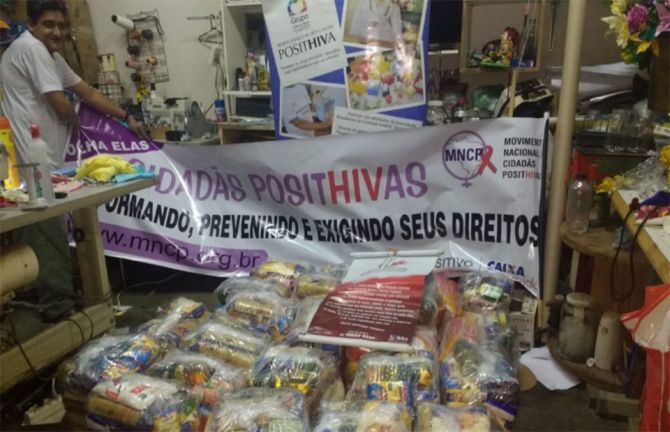
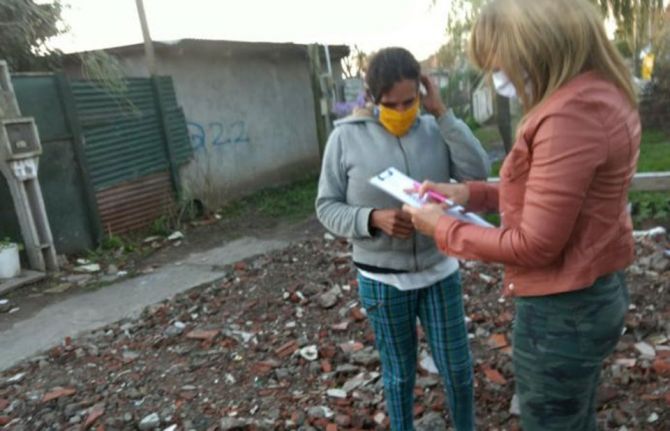
Feature Story
“My biggest concern is to get my antiretroviral medicines”: HIV and COVID-19 in Latin America
28 May 2020
28 May 2020 28 May 2020Since the start of the COVID-19 pandemic, Marcela Alcina, of the Latin American and the Caribbean Movement of Positive Women (MLCM+), has received more than 20 calls a day asking for help, either for food, medicine or advice on how to cope with the lockdown.
Yesenia Rodriguez (not her real name) made one of those calls. A Colombian by birth, she lived for more than 24 years in the Bolivarian Republic of Venezuela, but owing to the humanitarian crisis in that country, she had to return to Cali, Colombia, six months ago to access her treatment for HIV.
“There’s eight of us: my four children, my husband, my two grandchildren and me,” she said.
Ms Rodriguez does not have a job and needs help to feed her family and to access antiretroviral medicine. “I came back to Cali only to find myself living another crisis. My biggest concern is to get my antiretroviral medicines, but I don’t have access to health care in Colombia,” she said. “It’s been extremely tough for me and my partner, since we’re both living with HIV. My children and my husband are unemployed. Kids can’t put up with hunger the way we grown-ups do.”
Ms Rodriguez was put in contact with Yani Valencia of the Lila Mujeres Organization, part of the MLCM+ network. She was given a food package for her and her family, and she is being put in contact with someone who is able to ensure that she can access antiretroviral therapy. “I was about to pass out when they brought me these groceries, I was extremely happy.”
UNAIDS is recommending that, especially during the COVID-19 pandemic, people living with HIV keep necessary medical supplies on hand. The World Health Organization HIV treatment guidelines now recommend multimonth dispensing of three months or more of HIV medicines for most people at routine visits. However, according to a recent survey carried out by UNAIDS in Latin America and the Caribbean on the community needs of people living with HIV in the context of the COVID-19 pandemic, only one in 10 people reported having a three-month supply of antiretroviral therapy.
“We have met people who have no access to health care. A colleague of ours in Colombia borrowed a neighbour’s motorcycle to distribute medicines. We notice communities are overlooked quite often, but we must be a part of the answer. We couldn’t wait any longer, we had to do something,” said Ms Alcina.
Communities have played and continue to play a fundamental role in the AIDS response at the local, national and international levels. And now communities are playing a major role in the fight against COVID-19. MLCM+ has developed a network of 850 volunteers working in 17 countries in the region whose aim is to spread solidarity during the COVID-19 pandemic, keeping the focus on people living with HIV.
“We are distributing food and cleaning products, we are making masks that will later be distributed along with antiretroviral therapy, we are teaching people some prevention methods, we are giving condoms away and helping people find shelter in domestic violence situations,” said Ms Alcina.
MLCM+ is working across the region with UNAIDS, UN Women, the United Nations Population Fund and the United Nations Educational, Scientific and Cultural Organization, all of which are offering technical or financial support.
“UNAIDS provides us with resources, specialists and training webinars. The United Nations Educational, Scientific and Cultural Organization, on the other hand, helps us financially. That way, we are putting together a mechanism that intends to support the government’s actions, not replace them,” said Ms Alcina.
“We see how inequalities have become more evident during the COVID-19 pandemic. Inequality, and especially gender inequality, is exacerbated in times of crisis. Women living with HIV must be in the centre of the responses to both HIV and COVID-19, and must not be left behind,” said César Núñez, Director of the UNAIDS Regional Support Team for Latin America and the Caribbean.
Related links
Region/country
Related


Press Statement
UNAIDS welcomes the decision of the Constitutional Court of Colombia to strike down the section of the criminal code criminalizing HIV transmission
13 June 2019 13 June 2019GENEVA, 13 June 2019—UNAIDS welcomes the decision of the Constitutional Court of Colombia to remove the section of the criminal code that criminalizes HIV and Hepatitis B transmission. Overly broad criminalization of HIV transmission is ineffective, discriminatory and does not support efforts to prevent new HIV infections.
“Public health goals cannot be pursued by denying people their individual rights. The decision by the Constitutional Court of Colombia is a concrete step to ensure the law works for the HIV response, and not against it,” said Gunilla Carlsson, UNAIDS Executive Director, a.i. “UNAIDS will continue to advocate for a protective legal environment and the removal of punitive laws, policies, practices, stigma and discrimination that block effective responses to HIV.”
The Constitutional Court of Colombia established that the law violated the principles of equality and non-discrimination, as it singled out people living with HIV, stigmatising them and limiting their rights. The Court established that the law created a differential treatment that is not reasonable —and therefore constituted discrimination. The Court further established that such law violated the sexual rights of people living with HIV and it was ineffective to meet any public health objectives.
Overly broad and inappropriate application of criminal law against people living with HIV remains a serious concern across the globe. Nine jurisdictions in South and Central America and at least 77 others worldwide still criminalize HIV non-disclosure, exposure and transmission.
UNAIDS filed an intervention before the Constitutional Court of Colombia indicating that no data support the broad application of criminal law to HIV transmission to prevent HIV transmission. Rather, such application risks undermining public health goals and human rights protections. UNAIDS strongly commends the decision taken by the Constitutional Court to restore the dignity and rights of people living with HIV in Colombia.
In 2018, UNAIDS, the International Association of Providers of AIDS Care and the International AIDS Society convened an expert group of scientists who developed an Expert Consensus Statement on the Science of HIV in the Context of Criminal Law. The statement calls on the criminal justice system to ensure science informs the application of the law in criminal cases related to HIV.
UNAIDS
The Joint United Nations Programme on HIV/AIDS (UNAIDS) leads and inspires the world to achieve its shared vision of zero new HIV infections, zero discrimination and zero AIDS-related deaths. UNAIDS unites the efforts of 11 UN organizations—UNHCR, UNICEF, WFP, UNDP, UNFPA, UNODC, UN Women, ILO, UNESCO, WHO and the World Bank—and works closely with global and national partners towards ending the AIDS epidemic by 2030 as part of the Sustainable Development Goals. Learn more at unaids.org and connect with us on Facebook, Twitter, Instagram and YouTube.
Contact
UNAIDS GenevaSophie Barton-Knott
tel. +41 22 791 1697
bartonknotts@unaids.org
UNAIDS Media
tel. +41 22 791 42 37
communications@unaids.org
Press centre
Download the printable version (PDF)
Region/country

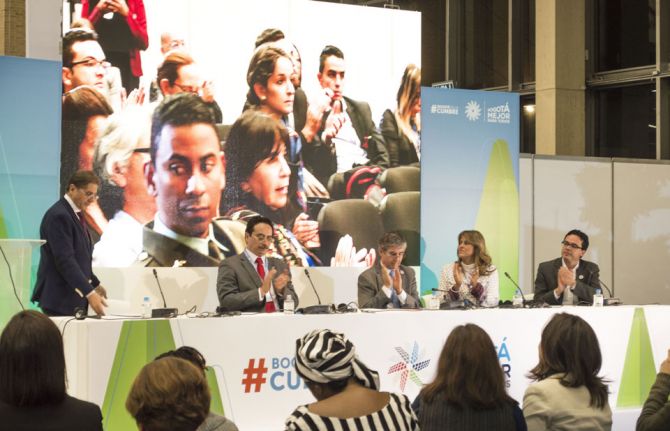
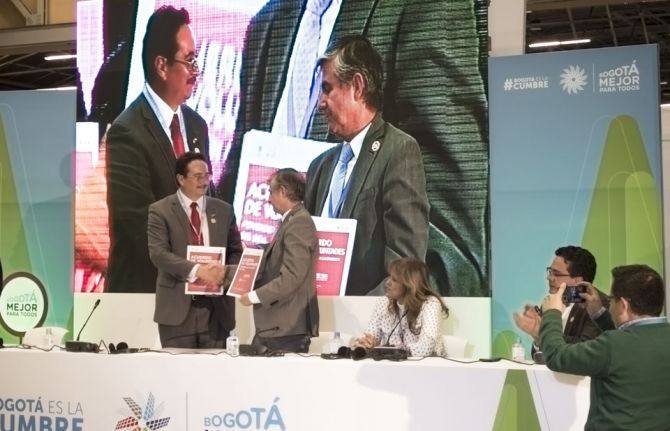
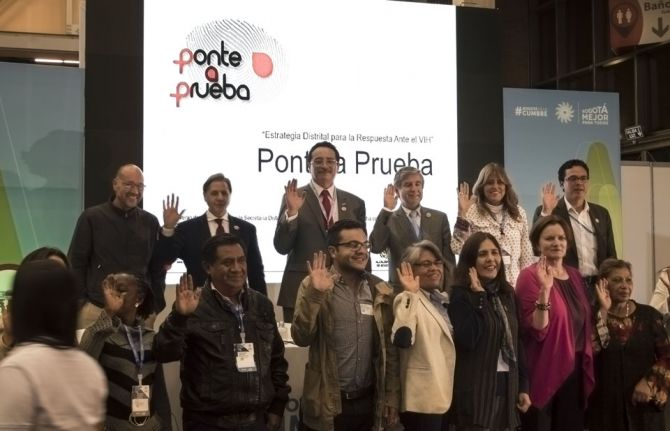

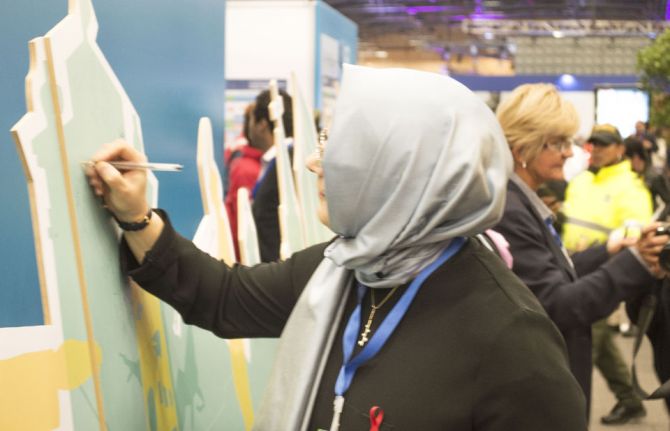
Update
Colombian city representatives join HIV prevention campaign
18 October 2016
18 October 2016 18 October 2016Representatives of Bogotá and Medellín joined the UNAIDS Hands up for #HIVprevention campaign during the World Summit of Local and Regional Leaders, which was held in Bogotá, Colombia, from 12 to 15 October. While participating in a side event entitled HIV and Cities: a Contribution to Healthy and Inclusive Societies, they also discussed what needs to be done to strengthen HIV prevention in urban settings.
The session identified innovative strategies to address the social and urban determinants of the HIV epidemic and to prevent new HIV infections through community-based services in cities. For example, the city of Medellín supports youth-friendly centres that provide a comprehensive package of HIV and sexual and reproductive health services. The city of Bogotá, for its part, has held since 2013 an HIV testing campaign targeting key populations and other people affected by HIV.
The participants agreed that cities will play a critical role in accelerating the HIV response and ending the AIDS epidemic by 2030. They underscored that adopting a Fast-Track response to HIV offers a platform to address other public health challenges, including sexual and reproductive health, maternal health and gender-based violence.
UNAIDS, UN-Habitat and the International Association of Providers of AIDS Care have supported the Fast-Track cities initiative since 2014. The initiative is aimed at engaging mayors and other urban leaders to accelerate the HIV response. Working together, cities can take local actions for global impact.
Quotes
“The city of Medellín has the mission to promote and achieve health equity and is committed to ending AIDS as a public health threat.”
“Innovative collaborations at the public and private level, with the involvement of the communities and civil society, are key to strengthening prevention efforts and to ensuring effective and sustainable responses to HIV.”
“I am optimistic that cities in Colombia will succeed in ending the AIDS epidemic in urban areas because I have already seen cities like Bogotá and Medellín successfully adopt accelerated AIDS responses in partnership with communities and civil society.”
Region/country
Related

Feature Story
UNHCR: Countering stigma and silence about HIV among refugees and host communities in northern Ecuador
04 March 2011
04 March 2011 04 March 2011A version of this story was first published at UNHCR.org

Lucilda, a young mother of two, recently discovered that her husband had infected her with HIV. He recently died and the Colombian refugee finds herself alone in an area where people living with HIV are stigmatized.
Credit: UNAIDS/V. Rodas
Ten years ago, a teenager called Lucilda* ran away from her home in Colombia because she feared her mother's rage after going to a party without permission. At the age of 25 she got married and fled to Ecuador with her husband to escape the conflict in southern Colombia's Putumayo department. Her husband was violent to her and unfaithful. He has since died of an AIDS-related illness and Lucilda is struggling to raise two children alone as a refugee in Ecuador.
"He was very ill, but he didn't want to go to see a doctor. I took him and they told us what was going on. They also said that I was infected," she added. "He knew that he had AIDS, but he never told me."
Lucilda is receiving antiretroviral treatment and both her children are HIV negative. She is one of a small, but growing, number of people living with HIV in northern Ecuador's Sucumbios province and its capital, Lago Agrio, where some 20% of the population of 60,000 are Colombian refugees. At least 30 people here were known to be living with HIV as of the end of last year, double the number for 2009.
"This figure is certainly just the tip of the iceberg with regard to the number of people who are infected with HIV," said Paul Speigel, head of UNHCR's Geneva-based Public Health and HIV Section.
But the lack of openness about HIV is difficult to tackle in a conservative, male-dominated society, where those living with HIV, especially women, face stigmatization. With understanding key to preventing new infections, UNHCR and its partners are trying to counter this mindset and to spread awareness about the virus.
I didn't want him to touch me, but he took a knife and forced me
Lucilda,* a woman living with HIV who is a refugee in Ecuador
A special UNHCR programme to prevent HIV has been implemented by community health workers, and is helping to educate refugees and host communities in isolated areas of the jungle surrounding Lago Agrio. They also give lessons on sexual health, family planning and general health services, explaining the importance of safe sex and ensuring that people have the knowledge and freedom to keep themselves safe from HIV. Tackling gender-based violence is also a major concern in attempts to halt the spread of HIV.
Lucilda has firsthand experience of such violence. When she found out that her husband had been having sex with other women his reaction was harsh.
"I didn't want him to touch me, but he took a knife and forced me," she recalled. "I felt as if I had been raped."
The new UNAIDS strategy 2011-15, promotes zero tolerance of gender-based violence and discrimination. It recognizes that such violence is a human rights violation. It can also hamper people’s ability to adequately protect themselves from HIV infection and make healthy decisions about how, when and with whom they have sex. To successfully challenge the AIDS epidemic it is seen to be of paramount importance that Lucilda and other women live their lives free from the threat of violence.
*Name has been changed to protect her identity
Related

Feature Story
‘Health Research in the Americas V’ focuses on HIV prevention
11 May 2009
11 May 2009 11 May 2009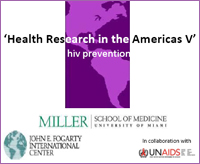
The Miller School of Medicine of the University of Miami and the Fogarty International Training Programme on AIDS and TB organized in collaboration with UNAIDS the ‘Health Research in the Americas V’ Conference on 7 and 8 May 2009, in Miami, Florida.
The aim of the conference was to highlight current evidence on HIV prevention, discuss the sustainability of comprehensive HIV prevention efforts as well as to debate how HIV prevention is situated within the broader discussion of ‘health in the Americas’ and other international development strategies.
Sir George Alleyne, Special Envoy of the United Nations Secretary General for HIV/AIDS in the Caribbean, was invited as a keynote speaker on the second day of the conference.
Numerous local and national achievements in curbing the epidemic have created a body of evidence about what works, but these successful approaches have not yet been fully applied.
At the conference, scientists, HIV prevention practitioners and policy makers explored scientific and programme experiences for prioritizing comprehensive, evidence-informed HIV prevention approaches and discussed effective solutions that could bridge the interface between HIV and other health and development issues.
The conference was open to behavioral scientists and researchers who work in the area of HIV prevention in the Americas, with a special focus on Guyana, the Dominican Republic, Jamaica, Brazil, Colombia and Peru.

